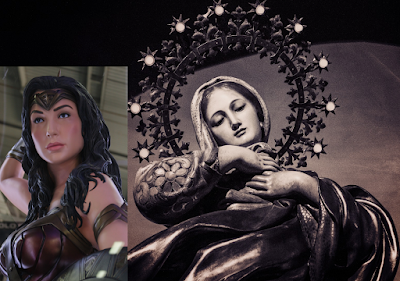Wonder Woman and the Triumph of the Immaculate Heart of Mary
By Tim McCauley |
Wonder Woman may be finishing her spectacular run at the box-office, but the one whom National Geographic called "The World's Most Powerful Woman," is far from finished her work. Is it unseemly to suggest parallels between the Mother of God and the quintessential female super-hero? Carrie Gress, in her book "The Marian Option," goes so far to say that "Mary wears combat boots," quoting a Marian priest while also citing the liturgy of the Church, which applies the following words to Our Lady: "Who is she that cometh forth as the morning rising, fair as the moon, bright as the sun, terrible as an army set in array?"
In the mythical-poetic imagination of the writers of Wonder Woman, the heroine Diana intervenes decisively in World War I by defeating Ares, the god of war. In actual fact, Mary the Mother of God did intervene in World War I, appearing at Fatima and beseeching people to pray the Rosary for peace. (What an intriguing coincidence that Wonder Woman was released in 2017, the 100th anniversary of Fatima).
In her engaging and inspiring study, Carrie Gress reminds us of many of the miraculous interventions of the Mother of God in the history of Christian civilization, most notably in safeguarding Christians from invasion by the Muslim Turks at Lepanto in 1571 and Vienna in 1683. One of the heroes of 1683, the Polish King Jan Sobieski, later testified, "I came, I saw, but God and Mary conquered." More important than any military victory, however, is her role in the conquest of sin and Satan, and the inauguration of the Kingdom of God. She confidently promised at Fatima, "In the end, my Immaculate Heart will triumph." In response to this proclamation, we do not sit on the side-lines as passive observers of her triumph; rather, the Mother of God enlists us to be co-heirs, asking for our prayers and penance so that we may participate in her victory.
One way of understanding the triumph of her Immaculate Heart is by considerating the interplay between justice and mercy, so admirably and effectively depicted in Wonder Woman. In one of the opening scenes, American spy Steve Travers crash lands on the island Paradise of the Amazonians, awakening them to the rude reality of millions of people killed in the "war to end all wars." Even though her own mother attempts to dissuade her, saying, "They (men) do not deserve you," a noble and profound sense of justice impels Diana to leave the security of her home and confront the horrors of WWI. As she herself testifies, she cannot stand by while innocent lives are being lost. She reminds her Amazonian sisters, "It's our sacred duty to defend the world."
In one of the most electrifying scenes in the movie, in the trenches in WWI, Diana is moved to take action when she meets a weeping mother and child from a terrorized village nearby. Her male comrades warn her she would face certain death before German machine-guns in "no man's land" -- where no man can go. They attempt to reason with her, saying, "We can't save everyone. That's not what we came to do." "No, but it's what I'm going to do." Key the music and watch her, in full Amazonian regalia, in slow motion climb out of the trench and join the battle!
She succeeds in saving the village with the help of a few brave men, but her simplistic solution to protect all innocent lives fails. After defeating the person she presumed was Ares, the instigator of all wars, nothing happens, and she is baffled. Then the real Ares reveals himself to her as a clearly Satanic figure who glides in and out of rooms like a shadow, whispering into people's ears, fomenting hatred in hearts, stoking the fires of violence and warfare.
The ensuing duel between Diana and Ares echoes the conflict between the woman and the dragon in the book of Revelation. With Satanic malice and envy, Ares tells Diana something to the effect of, "All I wanted was to show the gods how evil my father's creation was" -- human beings who are ugly, selfish and cruel -- who certainly do not deserve her help. The evil of humanity is vividly portrayed by the scar-faced female foil to Diana, the infamous Dr. Poison, the chemist who collaborated with the Germans to develop deadly poison gases. In a climactic moment of decision frozen in time, Diana is holding a tank over her head, while Dr. Poison cowers in fear. Ares is urging her to kill the hapless creature, symbol of all the ugliness of humanity. Diana's initial zeal for justice cannot withstand the mounting evidence of human evil, demanding of her a higher virtue, what Christians call mercy. The writers of Wonder Woman suggest this very thing, although with different language. In a flashback, Diana remembers her last encounter with Steve, who tells her, "I love you." (Earlier in the movie, while the audience heard of the history of the Amazonians, we learned that Zeus created the Amazons in part to "influence men's hearts with love").
When Ares parrots the earlier warning of Diana's own mother, that men do not deserve her help, she issues her final and definitive rebuke to his insidious rhetoric, "It's not about deserving. It's about what you believe . . . I believe in love." She mercifully releases Dr. Poison then turns to face Ares, who has resolved to destroy her, as he cannot persuade her to be his ally. He harnesses a mass of lightning energy from the sky to hurl at her, but his hate is impotent before the power of love rising in Diana's heart. With calm grandeur and serene confidence, she re-directs the energy blast that annihilates the god of war. Later, after the dust settles, in the quiet and reflective denouement of the movie, we hear Diana's voice-over concluding, "Only love will save the world."
The triumph of the Immaculate Heart of Mary is first of all the triumph of love -- love for human beings, most certainly, but first and foremost, love of God. The ultimate justice is to give God what is His due and fulfill the Great Commandment, as enunciated by Jesus -- to love God with all our heart and soul and strength. In the human heart of Mary, we behold a creature, a member of our race, perfectly fulfilling this command and helping us do the same.
It is easy to complain about the evils of the world, and to focus on other people's sins, weaknesses and failures, to talk ourselves into passivity, cynicism, and hopelessness. Diana had to endure the despairing voices of defeatism, but nothing deterred her from her mission: "It's our sacred duty to defend the world." Mary of Nazareth must have perceived among her contemporaries the ravages of the sin of the world. The words of St. Peter on Lot could analogously be applied to Mary: "Day after day, that just one, good as she was, felt herself tormented by seeing and hearing about the lawless deeds of those among whom she lived." Rather than give in to bitterness or resentment, however, the Virgin Mary discerned in her heart a deeper capacity and call, as if to say, "It's our sacred duty to love God with all our heart and soul and strength, and that's what I'm going to do." The prayer taught by the Angel at Fatima to the children would echo in the heart of Mary, "O my God, I believe, I adore, I hope in you, and I love you."
But when the commitment to justice and love comes face-to-face with the ugliness of sin, the malice of men and the ingratitude of the human heart, for love to triumph it must be transformed into mercy. What temptations must have assailed Mary at the foot of the Cross! Perhaps she was even tormented by an inner battle with the voice of Satan the Accuser. But she also heard the voice of her Son, "Father, forgive them; they know not what they do." As the perfect disciple of her Son, she did forgive.
The triumph of the Immaculate Heart of Mary, pierced with a sword, is the victory of Crucified Love in the Heart of Mary, the inseparable companion of the Sacred Heart of Jesus crowned with thorns. Thus it is necessary to include the second part of the prayer taught by the Angel: "O my God, I believe, I adore, I hope in you and I love you. I ask pardon for all those who do not believe, nor adore, nor hope in you, nor love you."
Most human beings, as children, have an experience of being loved by a beautiful woman (our mother) and even being "saved" by her whenever we were helpless. Deep in our unconscious, even as adults, we still have a desire to be saved by a beautiful woman, a beautiful mother. Many of us -- proud, independent and self-sufficient adults -- have difficulty admitting this, but as Jesus repeated in the Gospel, "Unless you become like little children, you cannot enter the kingdom of heaven." It is interesting to note, in times of war, how young men dying on the battlefield often instinctively cry out for their mothers. We do not have to wait until we are perishing to practice the heroism of humility that is within our grasp at this very moment.
Gress quotes from St. Maximillian Kolbe, a Marian "giant" on the essence of Marian devotion: "It is not a matter here of kneeling down a long time and praying, but of this relationship of a child to its mother . . . Different prayers and formulas are good and beautiful, but the essential thing is the simple relationship of a child to its mother, this sense of our need for this mother, the conviction that without her we can do nothing."
Justice, love and heroism are all on display in the epic of Wonder Woman. Humility and gratitude, trust and dependence, mercy and forgiveness, shine brilliantly in the life of the Mother of God, virtues that are also offered to us as powerful weapons of the Spirit to achieve victory in the battle of life, and our share in the triumph of the Immaculate Heart of Mary: the hallowed justice of loving God with all our heart, and in the face of all the sins and failings of our fellow human beings, the mercy of forgiving.





